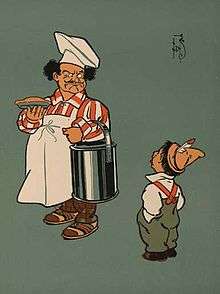Simple Simon (nursery rhyme)
| "Simple Simon" | |
|---|---|
 William Wallace Denslow's illustrations for Simple Simon, from a 1901 edition of Mother Goose | |
| Nursery rhyme | |
| Published | 1764 |
"Simple Simon" is a popular English language nursery rhyme. It has a Roud Folk Song Index number of 19777.
Lyrics
The rhyme is as follows;
- Simple Simon met a pieman,
- Going to the fair;
- Says Simple Simon to the pieman,
- Let me taste your ware.
- Says the pieman to Simple Simon,
- Show me first your penny;
- Says Simple Simon to the pieman,
- Indeed I have not any.
- Simple Simon went a-fishing,
- For to catch a whale;
- All the water he had got,
- Was in his mother's pail.
- Simple Simon went to look
- If plums grew on a thistle;
- He pricked his fingers very much,
- Which made poor Simon whistle.[1]
- He went for water in a sieve
- But soon it all fell through
- And now poor Simple Simon
- Bids you all adieu![2]
Origins

Simple Simon and the pie man, according to Denslow
The verses used today are the first of a longer chapbook history first published in 1764.[1] The character of Simple Simon may have been in circulation much longer, possibly appearing in an Elizabethan chapbook and in a ballad, Simple Simon's Misfortunes and his Wife Margery's Cruelty, from about 1685.[1] Another possible inspiration was Simon Edy, a beggar in the St Giles area in the 18th century.[3]
In popular culture
- Animation studio Comicolor produced an animated short based on the rhyme in 1935 titled Simple Simon. The short focuses mostly on an expanded version of Simon's encounter with the Pie Man and his visit to the fair, and also adds a pet goose to the cast. The short was directed by animator Ub Iwerks.
- UK 1970s childrens' programme Daisy Daisy featured a regular animated segment about Simple Simon who in each episode is bullied by antagonists The Meanies only to be rescued by the Pieman who defeats and humiliates the Meanies by throwing custard pies at them.
- The poem is briefly (and stutteringly) recited in the Merrie Melodies animated short I Love to Singa.
- Three Stooges: Moe and Shemp Howard performed a slapstick version of the poem's first two stanzas in the 1948 Stooges short Fiddler's Three, complete with humorously-mangled last line.[4]
Notes
- 1 2 3 I. Opie and P. Opie, The Oxford Dictionary of Nursery Rhymes (Oxford University Press, 1951, 2nd edn., 1997), pp. 333-4.
- ↑ https://www.youtube.com/watch?v=K0i-SdMOV4g
- ↑ Walter Thornbury, Edward Walford (1880), Old and New London: Westminster and the western suburbs Volume 3 of Old and New London: A Narrative of Its History, Its People, and Its Places, Old and New London, Cassell, Petter, & Galpin, p. 207
- ↑ www.threestooges.net/transcripts/view/121
External links
This article is issued from
Wikipedia.
The text is licensed under Creative Commons - Attribution - Sharealike.
Additional terms may apply for the media files.